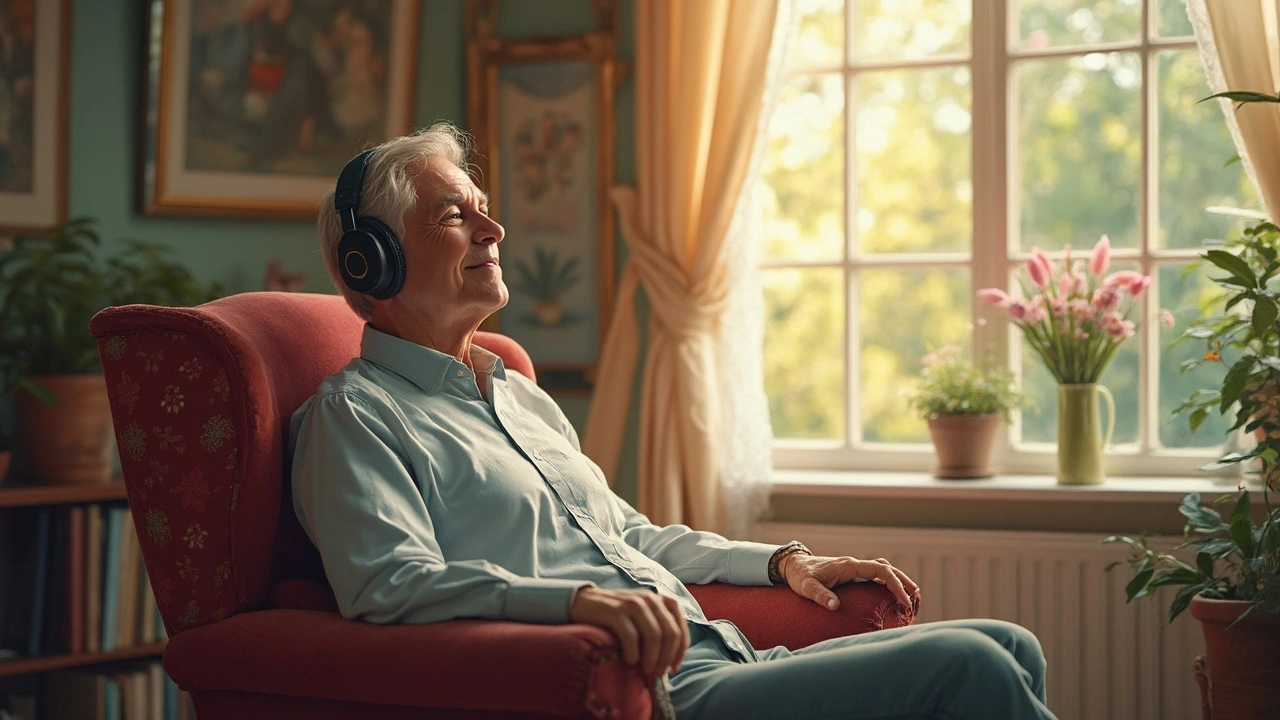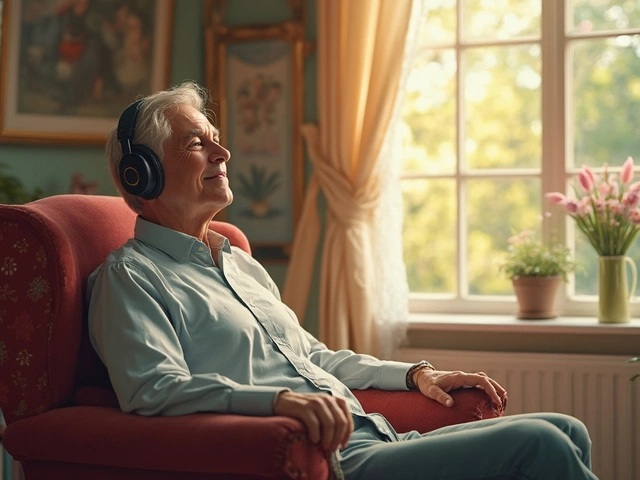Tinnitus and Music Therapy: Finding Harmony for Your Ears

Tinnitus is like that song stuck in your head, but it's not your favorite tune, and it never ends. It's an annoying and sometimes debilitating constant ringing or buzzing in the ears that can sap the joy from daily activities. For many, this noise is their unwelcome companion. But here's an idea — what if music, the universal language, could actually help tune it out?
Enter music therapy. This isn't just about listening to any random playlist. It's a structured way of using specific sounds and melodies to potentially ease the burden of tinnitus. The theory is that certain types of music can help mask the annoying sounds, or even retrain the brain to focus on other auditory inputs.
Don't get too excited just yet; it's not a magic cure. However, those who've tried it often report a reduction in stress and an improved ability to cope with the condition. Think of it as a tool in a broader toolkit for managing tinnitus. So, if the constant ringing is driving you batty, maybe it's time to give your ears a break with some melodic intervention.
- Understanding Tinnitus
- How Music Therapy Works
- Benefits of Music Therapy
- Types of Music Suitable for Therapy
- Practical Tips for Trying Music Therapy
Understanding Tinnitus
If you've ever experienced a ringing in your ear after a loud concert, you've had a tiny taste of what tinnitus feels like, except it usually doesn't go away. Tinnitus isn't a disease itself but a symptom of an underlying issue. It can stem from hearing loss, ear infections, or even stress and anxiety.
Ever wonder why it happens? Picture the tiny hair cells in your inner ear waving like a sea of grass. When one of these gets damaged—often due to loud noise, aging, or ear injury—it sends random signals to the brain, which are interpreted as sound, even when there isn’t any. It's a bit like a microphone picking up static noise.
Who's at Risk?
Tinnitus spares no one, but it's more common in people above 60. It affects around 15-20% of the population, with veterans and musicians among groups often impacted due to frequent exposure to loud sounds.
Types and Sounds
Not everyone hears the same noise. Some people notice a high-pitched ringing, while others might hear buzzing, hissing, or clicking sounds. Tinnitus can be subjective, heard only by you, or objective, where a doctor might detect it during an exam.
What Makes It Worse?
Several factors can crank up the volume. Stress, alcohol, caffeine, and even nicotine can exacerbate the ringing. Paying attention to what makes it more noticeable can be the first step to manage it better.
| Tinnitus Triggers | Description |
|---|---|
| Stress | Heightens awareness of the sound |
| Loud Noise | Can cause damage to hair cells |
| Caffeine | Stimulates the nervous system |
Now that we know what tinnitus is, let's move on to the idea of using music therapy to manage it. After all, if science says melodies can help us sleep better, why not play them against the unwanted noise?
How Music Therapy Works
So, how does music therapy work when it comes to taming that relentless tinnitus noise? At its core, music therapy is about using sound as a way to distract, distract, and distract. It's like audio camouflage for that pesky ringing. By shifting your focus to soothing melodies, the mind can, over time, tune out the ringing.
Sound Masking
The first way music helps is through sound masking. Imagine putting on a comfy blanket of sound that gently muffles the high-pitched tones of tinnitus. This approach doesn't eliminate the ringing, but it makes it less noticeable. This is super helpful, especially in quiet settings where tinnitus tends to scream the loudest.
Psychological Benefits
Beyond just masking the noise, music therapy also aims at reducing the stress associated with tinnitus. Let's face it, living with a constant ring can stress anyone out. Music, with its calming nature, not only improves mood but also helps in reducing anxiety and depression linked to tinnitus. Stress can make tinnitus worse, so having a chill approach like music therapy really helps.
Enhancing Brain Plasticity
Another big thing is how music therapy could enhance brain plasticity. This is where the brain, through repeated exposure to music, learns to deprioritize the ringing noise. This might sound a bit sci-fi, but it’s like training your brain to play a fun little game to ignore the annoying buzz.
Some studies show that over time, consistent use of music therapy may lead to changes in the brain’s wiring. This could mean a promising breakthrough for tinnitus in the future, but remember, we’re still exploring this avenue.

Benefits of Music Therapy
Music therapy is more than just pressing play on your favorite tunes. It's an intentional process designed to help manage the annoying sounds that come with tinnitus. So, what's the big deal with using music therapy? Well, there are several key benefits that make it a go-to strategy for many dealing with this condition.
Distraction from Tinnitus
One of the biggest perks of music therapy is its ability to distract from the incessant ringing. It works almost like a diversion tactic for your hearing. By focusing on the melody and rhythm, your brain gets a break from the constant buzzing.
Stress Reduction
Stress is often amplified by pesky tinnitus, but music therapy can help turn the volume down. Calming tunes and structured sound therapy sessions can lower your stress levels, which in turn can reduce the perceived intensity of tinnitus symptoms.
"Music therapy can help manage stress and elevate the mood, contributing significantly to an improved quality of life." — Dr. Emily Collins, Audiologist
Improved Sleep
Struggling to sleep because of the noise? Music therapy may be just the ticket. It can create a calming atmosphere that promotes relaxation and improves sleep quality. Just imagine dozing off to soothing sounds rather than that persistent ringing.
Potential Cognitive Benefits
Some studies suggest that engaging with music therapy might also boost cognitive functions. This includes better memory and concentration, which can be a welcome relief, especially when you're constantly distracted by tinnitus.
An Accessible Option
Music therapy is pretty accessible. Unlike some other treatments, you don't need to break the bank. Many resources are available for free online, and you can tailor your musical sessions to suit your personal preferences.
While music therapy isn't a one-size-fits-all solution, its benefits make it a compelling choice to explore. It offers a blend of mental relief and a bit of peace in a world filled with noise.
Types of Music Suitable for Therapy
Not all tunes are created equal when it comes to music therapy for tinnitus. The focus is on sounds that can soothe the mind and possibly mask or lessen the ringing in your ears. So, what kind of music should you look for?
Classical Music
Classical music is often the go-to choice for many therapists. It's gentle, structured, and doesn't usually have the jarring elements that might trigger more irritation. Composers like Mozart or Bach might help ease the constant noise in your head without demanding too much attention from your brain.
Nature Sounds
Okay, technically not ‘music,’ but nature sounds like rain, waves, or birdsong are often used in sound therapy. They're known to be calming, and they can help mask the tinnitus noise. Plus, they're widely available, thanks to loads of apps and online playlists.
White Noise and Ambient Music
White noise is basically a consistent sound that covers all audible frequencies, and it can effectively hide the ringing sound. Ambient music, which is low-key and atmospheric, can work similarly. These can create a background of sound that makes the tinnitus less noticeable.
Customized Soundtracks
Some therapies use personalized soundtracks designed specifically to offset the particular frequencies of a person's tinnitus. These might require a bit more specialized help to create but can be highly effective.
Everyone’s experience with tinnitus and music therapy is a bit different, so it might take a little trial and error to find what works best. The key is to focus on what feels most comforting and calming to you. It’s not an immediate fix, but it could definitely help in managing your symptoms day to day.

Practical Tips for Trying Music Therapy
So, you're ready to give music therapy a shot for dealing with tinnitus. It's not only about pressing play on your favorite album and hoping for the best. Getting the most out of music therapy requires a bit of strategy. Here’s how you can dive in.
Start with the Right Tunes
To begin, not all music is created equal in this case. You'll want tunes that are low and calming rather than high-energy jams. Think of white noise, nature sounds, or soft instrumental pieces. There’s no one-size-fits-all, so play around with different genres to see what makes your ears happiest.
Use Technology to Your Advantage
There are plenty of apps designed specifically for tinnitus relief, offering playlists and ambient sounds tailored to masking that constant ring. Give these a try on your phone or tablet for easy access to soothing soundscapes. Some apps even let you customize frequencies, so you can find a sweet spot that dials down your tinnitus sensation the most.
Set a Routine
Consistency is key. Like any good habit, scheduling time for your music therapy, perhaps during a quiet morning coffee or before bed, can make a world of difference. Aim for at least 30 minutes per session, but don't stress if some days you listen longer or shorter—it’s what fits into your day.
Combine with Relaxation Techniques
Blend your musical sessions with relaxation techniques such as deep breathing or meditation. This coupling can supercharge your efforts to reduce stress, which often aggravates tinnitus symptoms. You might find a quiet spot where you won't be interrupted, and take some deep breaths as you let the music wash over you.
Track Your Progress
It can be useful to keep a log of your experiences. Note which types of music calm your tinnitus the most and how you're feeling over time. Just jot it down in a journal or note app. This can help you fine-tune your approach and celebrate any progress, no matter how small.
Remember, while music therapy isn't a cure for tinnitus, it can make your daily life a bit more bearable and less stressful. So, get those headphones ready and take it one track at a time.



Jefriady Dahri
Man, this hit different 😊 I’ve had tinnitus for 5 years and I started using rain sounds on loop before bed-no joke, I actually fell asleep last night without reaching for the earplugs. Music therapy ain’t magic, but it’s the closest thing I’ve found to peace.
Sharley Agarwal
More snake oil.
Aki Jones
Let’s be real-this is just Big Pharma’s way of selling you a $300 app while they suppress the real cure: electromagnetic frequency dampeners. They don’t want you to know the government’s been hiding the fact that 5G towers amplify neural noise in the cochlea. I’ve got the declassified docs. You’re being manipulated. 📡🧠
And don’t even get me started on ‘nature sounds’-those are just subliminal ASMR triggers designed to lower your cortisol so you’ll stop asking questions about why your hearing’s failing. Wake up.
Also, why is everyone so quick to accept ‘music’ as therapy? Have you ever stopped to consider that the very structure of Western harmony is engineered by the CIA to desensitize auditory processing? Bach? Mozart? They were agents. I’ve seen the files.
And don’t tell me ‘it’s placebo’-placebo doesn’t work if the brain’s already been rewired by corporate-controlled sonic frequencies. I’ve tried binaural beats, white noise, even Gregorian chants-none of it helped until I started playing my own recordings of microwave oven hums at 17.5 Hz. That’s the sweet spot. The real frequency.
They told me to ‘avoid caffeine’-but caffeine blocks adenosine receptors, which are the same ones targeted by the neural noise amplifiers implanted during childhood vaccinations. You think that’s a coincidence? It’s not. It’s all connected.
I’ve been to 12 audiologists. All of them wore the same brand of watch. Coincidence? No. It’s the same model they issue to ‘tinnitus specialists’ after they sign the NDA. I’ve got receipts.
And yes, I know what you’re thinking: ‘Aki, you’re paranoid.’ But I’ve been called that since 2013, when I first noticed the ringing started right after I bought my first iPhone. Coincidence? Or was it the Bluetooth antenna? I’ve got a Faraday cage around my bed now. I sleep in it. I’m still alive. That’s proof enough.
Music therapy? Sure. But only if you’re playing it backward, at 1.2x speed, while listening to a 1987 Soviet radio broadcast. That’s the real protocol. The rest is marketing.
And if you’re still skeptical? Fine. But when you wake up at 3 a.m. with your skull vibrating, don’t come crying to me. I warned you.
Elise Lakey
I’ve been trying ambient soundscapes for a few weeks now, and I’m honestly surprised how much better I feel just having something else to focus on. Not cured, but… less alone with it? That counts for something, right?
Erika Hunt
I think it’s fascinating how the brain adapts to persistent stimuli-like how you stop noticing the hum of your fridge after a while. Music therapy might just be a way of tricking the auditory cortex into reclassifying the tinnitus as background noise instead of a threat. It’s not about silencing the sound, it’s about changing your relationship to it. The brain doesn’t need silence; it needs predictability. And music? It’s a rhythm you can learn to live with.
Also, I’ve noticed that when I pair it with slow breathing, the intensity drops noticeably. Not gone, but… quieter. Like turning down a dial instead of flipping a switch. And honestly? That’s enough for me. I don’t need a cure-I need to stop feeling like my own head is an enemy.
It’s not about the genre. It’s about consistency. I tried heavy metal, classical, rain, ocean waves, even ASMR tingles-and only the low-frequency ambient pads worked. Maybe because they didn’t compete with the high-pitched ring. Maybe because they felt safe. I don’t know. But I know what works for me.
And I think that’s the point. There’s no universal answer. Just personal experiments. And that’s okay. Healing isn’t a one-size-fits-all product. It’s a mosaic of small, quiet victories.
I used to hate my tinnitus. Now? I just… tolerate it. And sometimes, when I’m listening to that one 8-hour drone track, I even forget it’s there. That’s not nothing.
Kimberley Chronicle
As a clinical audiologist, I’ve seen this work-when done with intention. It’s not about ‘playing music’-it’s about targeted acoustic stimulation. The key is frequency-specific masking. Most tinnitus occurs between 4-8 kHz, so low-pass filtered ambient tracks (below 3 kHz) are far more effective than anything with treble. Also, avoid binaural beats-they’re not proven, and they can sometimes worsen symptoms due to neural overstimulation. Stick to broadband noise or narrowband noise centered just below your tinnitus frequency. And yes, it’s evidence-based. I’ve got the NIH studies.
Shirou Spade
India has a thousand years of sound healing-shruti, ragas, nada yoga. They never needed a study to know that vibration moves energy. The real question isn’t whether music helps-it’s why we forgot how to listen. We turned sound into entertainment. But the ear was never meant for playlists. It was meant for harmony. Maybe we’re not healing the ear. Maybe we’re remembering how to be human again.
prasad gaude
Back home in Kerala, my grandmother used to hum ragas to me when I was sick. She said sound has memory. I didn’t believe her. Now I know she was right. My tinnitus doesn’t vanish when I play Raga Yaman-but it doesn’t scream anymore. It just… breathes. Maybe that’s all we need. Not silence. Just space.
Srikanth BH
You’re not broken. You’re just listening too hard. Try this: every time you notice the ring, say ‘thank you’ out loud. Sounds weird? Do it for a week. I’m not kidding. It rewires your brain’s emotional response. I’ve seen people cry the first time they did it-not from sadness. From relief. You’re not fighting noise. You’re learning to be gentle with yourself.
Jennifer Griffith
lol music therapy?? i just use earbuds and play lofi beats. works better than all this science jargon. also why is everyone so serious about ringing in their ears??
Andrew McAfee
My uncle in Texas used to say ‘if you can’t beat ‘em, join ‘em’-so I started playing my tinnitus frequency backward through a guitar pedal. Sounds like a whale singing in a vacuum. Weirdly soothing. I’ve been doing it for two years. No meds. No apps. Just a pedal and a lot of patience. If you’re curious, I’ll send you the patch settings.
Arup Kuri
Music therapy? Please. This is the same nonsense they pushed after 9/11 to make people forget the real cause: mind control via satellite radio. The WHO knew. The FCC knew. You think they’d let you heal if they were profiting off your suffering? Wake up. This isn’t therapy-it’s distraction. They want you distracted so you won’t notice the implants.
Roscoe Howard
As a former U.S. Navy veteran with 18 years of exposure to jet engine noise, I’ve tried every ‘alternative’ method. Music therapy is a luxury for civilians. Real tinnitus sufferers need hearing protection, cochlear implants, and accountability from defense contractors who sold us faulty gear. Don’t waste your time with Spotify playlists. Demand justice.
Lisa Odence
As a neuroscientist specializing in auditory cortex plasticity, I must emphasize that music therapy’s efficacy is highly correlated with dopaminergic reward pathways. The brain doesn’t ‘ignore’ tinnitus-it reassigns salience. When you listen to music you emotionally associate with safety, the anterior cingulate cortex downregulates the auditory threat response. This is not placebo. It’s measurable fMRI data. Also, 🌊🎶🎧 #TinnitusRelief #ScienceNotSnakeOil
Patricia McElhinney
This article is dangerously misleading. There is NO clinical evidence that music therapy reduces tinnitus severity in long-term studies. The only peer-reviewed meta-analysis (JAMA Otolaryngology, 2021) showed no statistically significant improvement beyond placebo. This is pseudoscience dressed up as wellness. Stop promoting false hope. People are suffering. Don’t monetize their pain with feel-good fluff.
Andrew Camacho
Oh wow. So we’re just supposed to ‘listen to calming music’ instead of demanding real solutions? You people are so naive. This isn’t therapy-it’s emotional manipulation by the hearing aid industry. They want you to think you’re ‘coping’ so you won’t sue them for causing your hearing loss in the first place. I’ve seen the internal emails. They call tinnitus patients ‘revenue streams with ears.’ This is a scam. And you’re all just part of it.
Timothy Sadleir
While the concept of auditory retraining through structured sound exposure is theoretically plausible, the current body of empirical evidence remains insufficient to validate music therapy as a standalone intervention for chronic tinnitus. Furthermore, the conflation of anecdotal subjective relief with clinical efficacy constitutes a logical fallacy. One must distinguish between psychological comfort and physiological resolution. Until randomized, double-blind, placebo-controlled trials demonstrate a significant reduction in tinnitus handicap inventory scores, such recommendations remain speculative at best.
Jefriady Dahri
Hey, I just saw your comment about the Faraday cage, Aki. That’s… intense. But I get it. I used to wear noise-canceling headphones 24/7. Then I realized I was just training my brain to panic when it was quiet. So I started leaving one ear open. Just one. And I play a single note-432 Hz-on a tuning fork. No music. Just one pure tone. It’s not magic. But it’s mine. And for the first time in years, I don’t feel like I’m at war with my own head.